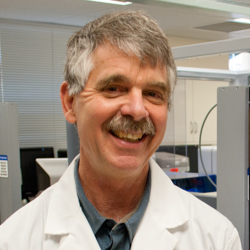Personal Statement
My research efforts over more than a 25 year period have focused largely on studies of leukocyte biology, particularly cell-cell interactions (e.g., adhesion, signal transduction and cell-mediated cytotoxicity) and cellular receptors (e.g., LFA-1, VLA-4, FPR, FPRL1). A common thrust of much of this work has been the development of new methodological approaches that exploit the unique measurement capabilities of flow cytometry to provide novel biological insights.
I hold multiple patents and registered software copyrights related to development of novel HyperCyt technology that has enabled flow cytometers for up to a 20-fold increase in sample processing throughput. This technology underpinned our establishment of the New Mexico Molecular Libraries Screening Center (now UNM Center for Molecular Discovery) as 1 of 10 national screening centers in the pilot phase of the NIH Roadmap Molecular Libraries Screening Center Network initiative and subsequently, in the ensuing production phase, as 1 of 3 Specialty Probe Production Centers in the Molecular Probe Production Centers Network.
In addition to my roles as Leader of the UNMCMD HTS Core and director of the UNM Shared Flow Cytometry and HTS Resource, I have been responsible for implementation and oversight of screening campaigns at our center for 6 cell-based screening targets (formylpeptide family members FPR and FPRL1, drug transporters ABCB1 and ABCG2, and a phenotypic screen for probes of bacterial Quorum Sensing pathways) that to date have identified 4 novel, small molecule probes. I recently completed a NIH funded project to develop the next generation of high throughput flow cytometry technology that further quadruples throughput, enabling routine analysis in 1536 well plates at 60,000 wells/day. This technology has been successfully applied to screening of cell and bead-based bioassays against the 360K compounds of the NIH MLSMR small molecule library.
I formally retired January 1, 2017, but have assumed a post-retirement position at the Center for Molecular Discovery that involves my role as subcontract PI of an NIH R01 Grant to identify novel T-cell immune stimulating compounds as well as acting in an advisory capacity to facilitate ongoing research and high throughput screening activities in the CMD. The diverse combination of skills and experience that I have acquired over the years in cell biology, immunology, technology development and bioassay design and miniaturization uniquely qualifies me to facilitate future research and screening projects associated with this Cancer Center Support Grant application.

